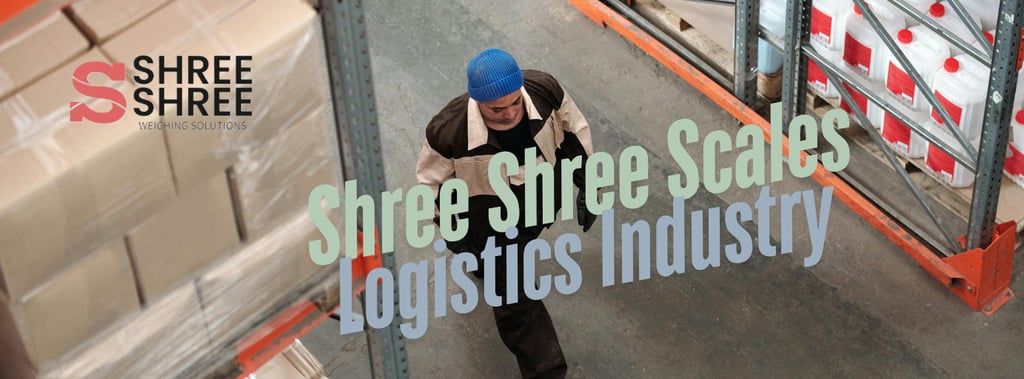Weighing Scales for the Logistics Industry: Enhancing Efficiency and Accuracy in Shipping and Freight
In the logistics industry, accurate measurements are essential for managing inventory, optimizing shipping costs, and ensuring regulatory compliance. Whether it's measuring the weight of goods, determining cargo capacity, or ensuring precise packaging, weighing scales are an integral tool that improves operational efficiency. This blog explores how weighing scales play a pivotal role in the logistics and freight industry, helping businesses streamline their operations and reduce costs.
4/28/20255 min read


1. Accurate Weighing for Shipping and Freight Management
The shipping and freight industry is driven by precise measurements, especially when it comes to calculating shipping costs, adhering to weight restrictions, and managing load capacities. Weighing scales help logistics providers determine the accurate weight of packages and freight, ensuring that shipping calculations are accurate and compliant with transportation regulations.
Platform scales are commonly used to weigh large shipments, ensuring they fall within the permissible weight limits for trucks, containers, and air freight.
Dynamic checkweighers are used to measure goods in motion on conveyor belts, offering fast and efficient weight checks.
By using accurate weighing systems, logistics companies can ensure proper billing, avoid overloading, and maintain regulatory compliance, all while improving customer satisfaction through accurate deliveries.
2. Streamlining Inventory Management and Stock Control
Effective inventory management is a cornerstone of success in the logistics industry. Weighing scales help businesses track the weight of goods in storage and manage stock levels, preventing overstocking or understocking. Accurate inventory data is essential for minimizing waste, optimizing storage space, and ensuring the smooth flow of goods throughout the supply chain.
Counting scales can track the weight of bulk items in warehouses, enabling logistics companies to accurately assess stock levels.
Inventory management systems integrated with weighing equipment allow for real-time tracking of goods in and out of storage.
With accurate weighing technology, logistics companies can improve inventory visibility, reduce stockouts, and optimize warehouse space.
3. Weighing for Freight and Cargo Optimization
Freight optimization is crucial for ensuring that shipping costs are minimized and that goods are safely transported. Weighing scales play an important role in determining the weight of cargo and ensuring that it is distributed optimally within vehicles or containers to comply with weight distribution requirements.
Freight scales are used to measure individual items or pallets to determine the best way to arrange them within a shipping container or truck.
Container weighing systems ensure that the weight of the entire load does not exceed legal limits for transport, reducing the risk of accidents or fines.
By employing advanced weighing solutions, logistics companies can optimize cargo loading, minimize shipping costs, and maximize transportation efficiency.
4. Ensuring Compliance with Weight Regulations
Regulatory compliance is critical in the logistics industry, as various transportation authorities impose weight limits for vehicles, freight, and shipments. Weighing scales help ensure that all shipments comply with these regulations, reducing the risk of fines, penalties, and delays caused by overweight cargo.
Vehicle scales and truck weighbridges are used to weigh freight trucks, ensuring that the vehicle does not exceed weight limits while adhering to transportation laws.
Axle weighing scales ensure that the weight distribution on each axle complies with legal limits, preventing damage to roads and ensuring vehicle safety.
By utilizing compliant weighing systems, logistics companies can avoid regulatory violations, reduce the risk of fines, and ensure the safety and legality of their operations.
5. Enhancing Operational Efficiency in Freight Handling
Handling freight efficiently requires a well-organized approach to measuring and tracking goods. Weighing scales contribute to greater operational efficiency by providing accurate measurements that improve the speed and accuracy of freight handling, reduce errors, and streamline processes.
Industrial scales and floor scales are used to weigh goods and materials during the loading and unloading process, helping workers quickly verify package weights.
Automated weighing systems help reduce manual handling, increase throughput, and minimize the risk of human error.
By incorporating automated weighing solutions, logistics companies can increase workflow efficiency, reduce bottlenecks, and ensure faster delivery times.
6. Improving Shipping Cost Estimations and Billing
Shipping costs are typically calculated based on the weight of the goods being shipped. Weighing scales help logistics companies determine the correct weight of shipments, enabling them to provide accurate shipping cost estimates and billing to clients.
Shipping scales help determine the weight of goods before they are dispatched, allowing logistics companies to calculate freight costs accurately.
Data integration with accounting systems allows for automatic invoicing based on the measured weight, improving billing accuracy.
With accurate weighing solutions, logistics companies can improve cost transparency, avoid underbilling or overbilling, and ensure fair pricing for their services.
7. Enhancing Customer Satisfaction with Accurate Deliveries
Customer satisfaction is a key factor in the logistics industry, and delivering goods on time and in the right quantity is crucial for maintaining a positive reputation. Weighing scales ensure that the right amount of goods are dispatched and delivered, preventing errors such as missing items or incorrect weight charges.
Pre-shipment weighing ensures that the correct weight is recorded before goods leave the warehouse, preventing discrepancies during transportation.
Delivery checkweighers allow companies to verify the weight of goods before they are handed over to customers, ensuring that the correct shipment has been delivered.
By using precise weighing technology, logistics companies can improve order accuracy, reduce errors, and enhance customer satisfaction.
8. Weighing for Dangerous Goods and Hazardous Material Handling
In the logistics industry, the transport of hazardous materials requires careful attention to safety and regulatory compliance. Weighing scales are used to ensure that hazardous goods are properly accounted for, correctly labeled, and safely transported, reducing the risk of accidents or spills.
Hazardous material weighing ensures that the weight of dangerous goods is accurately recorded and that the correct precautions are taken during shipping.
Compliance scales ensure that the weight of hazardous materials does not exceed legal limits for transport, and that the goods are handled in accordance with safety regulations.
By utilizing specialized weighing systems for hazardous materials, logistics companies can enhance safety, prevent accidents, and ensure regulatory compliance.
9. Supporting Sustainability and Waste Reduction in Logistics
Sustainability has become a growing priority in the logistics industry, and weighing scales help businesses achieve more eco-friendly operations by reducing material waste and optimizing resource usage.
Weighing equipment helps logistics companies track material usage and minimize excess packaging, reducing waste and lowering environmental impact.
Weight-based optimization ensures that shipments are packed efficiently, making the best use of available space and resources.
By adopting sustainable weighing practices, logistics companies can reduce their carbon footprint, improve resource efficiency, and meet growing environmental demands from consumers and regulators.
10. Tracking and Monitoring Shipment Weight for Real-Time Data
In today’s fast-paced logistics industry, real-time data is crucial for optimizing operations, improving delivery times, and tracking inventory. Weighing scales with real-time data logging capabilities allow logistics providers to monitor the weight of goods throughout the shipping process.
Real-time weighing systems enable logistics companies to track shipments, monitor inventory levels, and ensure that shipments are within weight limits.
Data logging systems allow businesses to access detailed records of weight measurements for auditing, performance tracking, and process improvement.
By using real-time weighing technology, logistics companies can improve operational visibility, track shipments, and enhance decision-making.
Conclusion
In the logistics industry, weighing scales are crucial tools that ensure accurate measurement, compliance with regulations, and operational efficiency. From shipping and freight management to inventory control and cost optimization, weighing systems play an essential role in improving the overall logistics process. By adopting precise, automated weighing solutions, logistics providers can reduce operational costs, enhance customer satisfaction, and ensure that their operations remain compliant and efficient.
At Shree Shree Weighing Solutions, we offer a wide range of weighing scales designed to meet the specific needs of the logistics industry. Whether you need platform scales, checkweighers, or dynamic weighing systems, our products provide the accuracy and efficiency required for modern logistics operations.
Need Reliable Weighing Solutions for the Logistics Industry?
📞 Contact us today to explore our customized weighing solutions for the logistics and freight sector.
📍 Visit our Ahmedabad showroom, or schedule a demo at your facility across Gujarat.
